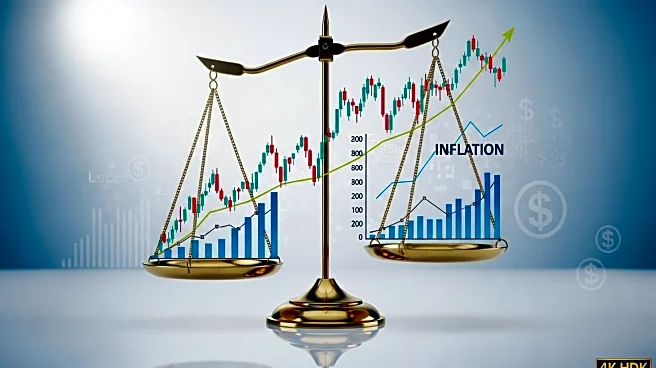What's Happening?
President Trump has announced a series of new tariffs on imported goods, including 100% duties on branded pharmaceutical products, 25% levies on heavy-duty trucks, and 50% tariffs on imported kitchen cabinets and bathroom vanities. These tariffs are expected to affect key partners in Asia and Europe, potentially reigniting fears of a trade war. The announcement comes as Wall Street indexes show mixed futures, with investors awaiting key inflation data that could influence interest rate cut bets. The Dow E-minis were up 73 points, while the S&P 500 E-minis and Nasdaq 100 E-minis showed slight declines. The tariffs have already impacted stock movements, with Eli Lilly and Viking Therapeutics seeing gains, while furniture companies like Wayfair and Bed Bath & Beyond experienced declines.
Why It's Important?
The new tariffs introduced by President Trump could have significant implications for the U.S. economy and global trade relations. By imposing high duties on imported goods, the administration aims to protect domestic industries but risks escalating trade tensions with international partners. This move could complicate the inflation outlook, as increased costs for imported goods may lead to higher consumer prices. The Federal Reserve's decision-making on interest rates could be influenced by these developments, affecting market stability and investor confidence. Industries reliant on imports, such as pharmaceuticals and furniture, may face increased costs, impacting their profitability and market performance.
What's Next?
Investors and market analysts will closely monitor the upcoming release of the Personal Consumption Expenditures price index, the Federal Reserve's preferred inflation measure, to assess the impact of the new tariffs on inflation trends. The Federal Reserve may reconsider its approach to interest rate cuts, potentially delaying them until December. Additionally, remarks from Federal Reserve officials later in the day could provide insights into the central bank's stance on inflation and trade policies. Companies affected by the tariffs may need to adjust their strategies to mitigate increased costs, while policymakers may face pressure to address trade tensions and economic uncertainties.
Beyond the Headlines
The introduction of new tariffs by President Trump highlights the ongoing debate over protectionism versus free trade. While the tariffs aim to bolster domestic manufacturing, they may also lead to unintended consequences, such as increased consumer prices and strained international relations. The broader implications of these trade policies could affect global supply chains and economic growth, prompting discussions on the balance between national security and economic interdependence. As industries adapt to these changes, the long-term impact on innovation, competitiveness, and market dynamics remains uncertain.









